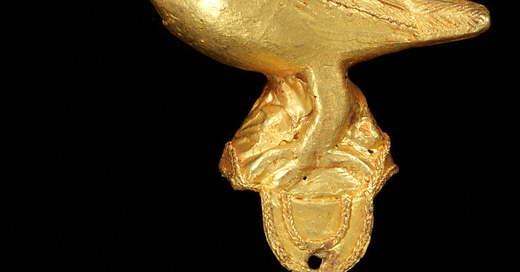🔅 Britain Loans Looted Artefacts Back to Ghana & Mali's Mining Tragedy
Plus, Minister Calls Starved Ugandans 'Idiots' & Nigeria's Innovative Tyre Recycling
Photo of the Day

Brief & Bright: Africa's Top Five
Britain's Looted Bling: A Gold Regalia Is Loaned Back to Ghana
Britain is finally saying, "Alright, we'll let you borrow them", to Ghana, which has been fighting to have their gold treasures, looted over 150 years ago, returned. Yes, you read that right – it is a loan, not a return. These 32 glittery artefacts, including a gold peace pipe (because who doesn't want to make peace in style?) and a sword of state, are headed back to their homeland, but only for a temporary visit.
Stolen during the Anglo-Asante wars of the 19th century, these pieces are a big deal to the Asante people, symbolizing cultural, historical, and spiritual significance. They're currently parked at the British Museum and the Victoria & Albert Museum in London but are getting packed to go to the Manhyia Palace Museum in Kumasi, Ghana.
This whole "borrow your own stuff" scenario highlights a hot debate over colonial loot. Countries like Nigeria and Ethiopia are also queuing up, asking for their treasures back. But British museums claim that, by law, they are not allowed to hand back the treasures. The return (well, sort of) of Ghana's regalia was spurred by Asante King Otumfuo Osei Tutu II's negotiations during a trip to London for King Charles' coronation.
Ugandan Minister's "Idiot" Remark on Hunger: A Recipe for Outrage
Uganda's State Minister for Foreign Affairs, Henry Okello Oryem, has stirred up a storm by calling those who died of hunger in his country "idiots." In a country where over 2,200 people succumbed to starvation in 2022, Oryem's choice of words was unwelcome.
He suggests that, with Uganda's fertile land and agreeable climate, people should just roll up their sleeves and grow their own food. "It's only an idiot, a real idiot, that can die of hunger in Uganda," he declared, possibly while not standing in a barren field.
Critics are calling his comments tone-deaf, with a legislator from the hard-hit Karamoja region pointing out that sometimes, no matter how green your thumb is, Mother Nature just says no. Charles Onyango-Obbo, a prominent Ugandan author, chimed in too, suggesting that Oryem might be missing the bigger picture – that hunger in Uganda is also more about distribution than a lack of effort.
Mali's Gold Mine Collapse: A Tragic Reminder of the Risks in Artisanal Mining

Last week in southwest Mali, over 40 artisanal gold miners met with tragedy when their mining shaft collapsed. It's a reminder of the cost of hunting for gold. The accident occurred in the Kangaba Cercle of the Koulikoro Region. Baye Coulibaly, the mines ministry spokesperson, lamented the use of outdated and unregulated mining methods, noting that the ministry had repeatedly warned against such risky practices.
Despite these warnings, the lure of gold proves too tempting for many. Artisanal mining, often a hardscrabble affair with miners digging in precarious conditions, contributed an estimated six tonnes of gold in Mali last year.
Nigeria's Tire Transformation: From Roads to Rubber Slippers and Beyond

A Nigerian company, Freee Recycle, is turning the country's old tyres into, well, pretty much everything. The country, in the first place, has a bit of a tyre problem – if you take a stroll, you're likely to trip over at least one. And here's where Freee Recycle rolls in, having picked up over 600,000 tyres and given 400,000 of them a glamorous makeover into bricks, floor tiles, and even flip-flops. Sure, some of their products are pricier than their traditional counterparts, but they're meant to last longer. Since its 2018 debut with four employees, the company has pumped up its workforce to over 150. Available in big cities like Lagos, Abuja, and Port Harcourt, Freee Recycle's mission is clear: turning Nigeria's tyre troubles into treasures.
South Africa’s Surge: TotalEnergies Plans

South Africa, grappling with persistent power cuts, is poised for an energy boost. TotalEnergies, the France-based energy giant, has announced plans to construct a massive 216 megawatt (MW) solar plant, complete with a 500 MWh battery storage system in the Northern Cape province. Set to be operational by 2025, this project marks a significant stride in South Africa’s shift towards clean energy and away from its reliance on coal.
Financially greenlit on December 14, the project is a consortium affair. TotalEnergies holds a 35% stake, with Hydra Storage Holding and Reatile Renewables owning 35% and 30%, respectively. This solar powerhouse is designed to pump continuous green electricity into the national grid, even when the sun’s not shining, thanks to its hefty battery storage. Vincent Stoquart, Senior VP for Renewables at TotalEnergies, underscores the project's benefit: aiding South Africa’sAfrica’stransition and bolstering the resilience of its power system.
With Eskom’s vision that each megawatt can light up 650 homes, this plant has the potential to energize around 140,000 households. This initiative is part of a broader, ambitious push by South Africa to combat its electricity crisis, which has been a significant drag on its economy.
Food for Thought
“Knowledge without wisdom is just like water in the sand."
— Guinean Proverb






« However, some museums say they are banned by law from permanently returning contested items in their collections », great idea having created laws that forsaw no changes in the status quo of the colonial agenda. It’ high time to change these laws!